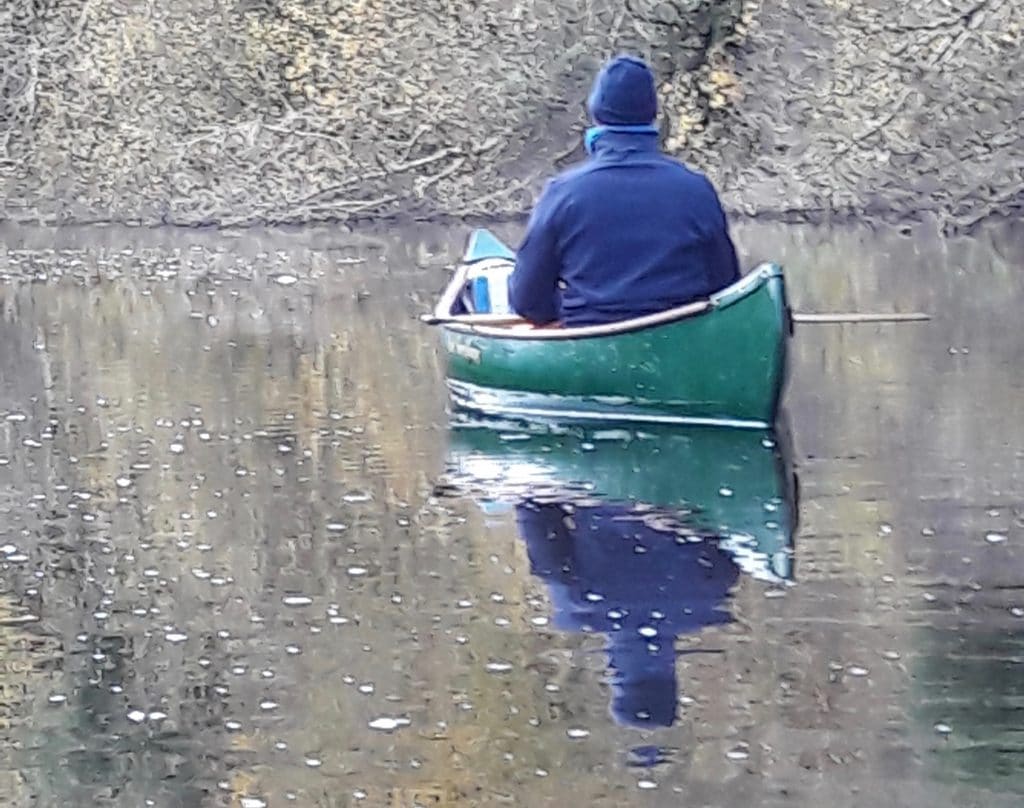“ Aerobic exercise releases endorphins, which makes you feel happy, and gets you out and about talking to other people. These things are probably useful for mental health. But what about mindfulness? What do people mean when they keep talking about it? How likely is it to happen when swimming?”
I’m glad I learned to paddle a Canadian canoe. Having control of the boat means I can drift with the current on the river Teifi, sitting still, listening to the birds.
We went for a gentle paddle in the autumn sunshine last week. Now and then I rested my paddle and just sat. With the soles of my feet on the floor of the boat, I sent my head towards the sky and allowed my back to widen. My breathing opened up and my ears enjoyed the sensation of moving forward very slowly.
Drifting is the part of canoeing I like best but, without the ability to steer, it would be no fun at all. I’d be bouncing from bank to bank, stressed and tense, with the boat refusing to move in a straight line.
Being able to swim is important for the access it gives you to activities like canoeing. And in the water, you can discover the freedom of just floating, rather than swimming great distances. But, just as to be able to drift in your canoe, you need to know how to paddle it, to enjoy non-doing in the water, you need to be a reasonably competent swimmer. This would be my reason for recommending people to learn to swim.
Aerobic exercise may improve cardiovascular health, tone muscles and keep your bones strong. It releases endorphins, which makes you feel happy, and gets you out and about talking to other people. All these are good things and probably useful for mental health.
But what about mindfulness? What do people mean when they keep talking about it? Does it have anything to do with the above benefits? How likely is it to happen when swimming?
On my Alexander Technique training course I was taught to seek internal quietness by waking up my brain and taking the brakes off my body. In a teacher’s hands, my energy would begin to flow, my breathing would open up, my heart and nerves would flutter as I became lighter and ready for a simple movement. Moments of being present – mindful – were found not in an attempt to make myself move but in the expansion and calmness that arose when I stopped.
Leaving yourself alone and allowing yourself just to ‘be’ takes a lot of practice. The work is for a moment of quietness, of integration, of allowing your body to breathe, of connection with your environment. We can’t be like that all the time. We need to to get on with things. Sometimes we need to swim.
But seeking opportunities for more of these moments might be the best way to look after our mental health. Alexander said his technique, which people tended to associate with physical posture, was ‘the most mental thing there is’. It could be said that the attainment of mental health is the most physical there is. You can’t be ‘in the moment’ if your head is jammed on the top of your spine. But it isn’t likely that many of us, regardless of endorphins, will attain mindfulness during, or through doing, vigorous exercise. Or in noisy swimming pools or triathlon races.
Calm water is a suitable environment but, if it’s mental health benefits you’re after, it might be a good idea to swim less and work for more quiet moments.


